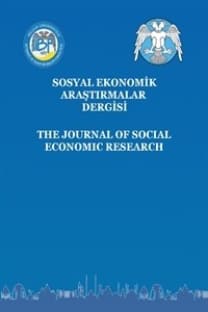TÜRKİYE’DE BEŞERİ SERMAYE VE EKONOMİK BÜYÜME İLİŞKİSİ: EŞBÜTÜNLEŞME YAKLAŞIMI İLE NEDENSELLİK TESTİ, 1926-1994
Büyüme literatürüne egemen olan neo-klasik kurama alternatif olarak geliştirilen içsel büyüme teorileri, teknoloji içselleştirerek ve neo-klasik kuramın varsayımlarını değiştirerek iktisat yazınına önemli bir katkı yapmıştır. Bu yeni büyüme teorilerinde beşeri sermayenin ekonomik büyümeye kaynaklık edeceği açık bir şekilde ifade edilmektedir. Bu çalışmada, beşeri sermaye ile ekonomik büyüme arasındaki ilişki nedensellik bağlamında değerlendirilmiş ve beşeri sermaye ile ekonomik büyüme arasındaki nedensellik ilişkisinin yönünün seçilen beşeri sermaye ölçütüne duyarlı olduğu görülmüştür.
Anahtar Kelimeler:
Beşeri Sermaye, Eğitim Harcamaları, Sağlık Harcamaları, Ekonomik Büyüme, Eşbütünleşme, Nedensellik
Endogenous growth theories, are developed as an alternative to the neo-classical growth approach which dominated the growth literature for a long time, have had an important contribution to the economic literature by endogenising technology and changing the assumptions of the “old” growth theory. In this new theory, human capital is clearly accepted as an important determinant for the growth. In this presentation, the relationship between human capital and economic growth is investigated in terms of causality and it is found that the causality issue between the variables is sensitive to the choice of the human capital measurement.
Keywords:
Human Capital, Education Expenditures, Health Expenditures, Economic Growth, Co-Integration, Causality,
- ISSN: 2148-3043
- Yayın Aralığı: Yılda 2 Sayı
- Başlangıç: 2000
- Yayıncı: Selçuk Üniversitesi
Sayıdaki Diğer Makaleler
TÜRKİYE’DE YEREL SİYASAL ELİTLER: HATAY İLİ ÖRNEĞİ
YÖNETİME KATILMA BİÇİMLERİ VE YEREL YÖNETİMLERDE DEMOKRATİK MEKANİZMALAR
KAMU HİZMETİ SUNUMUNDA GÖNÜLLÜ KURULUŞLAR VE DEVLET
ÖRGÜTLERDE YILDIRMA UYGULAMALARI (MOBBİNG) VE ÇATIŞMA ARASINDAKİ İLİŞKİ
Tuncer ASUNAKUTLU, Barış SAFRAN
TÜRKİYE’DEKİ İLLERİN SOSYO-EKONOMİK GELİŞMİŞLİK DÜZEYLERİNİN BELİRLENMESİ
Hülya ŞEN, Fatih ÇEMREK, Özer ÖZAYDIN
Zeynep KARAÇOR, Volkan ALPTEKİN
DEVLET SINIFLANDIRMALARI VE ZAYIF DEVLETLERİN KARAKTERİSTİK ÖZELLİKLERİ
